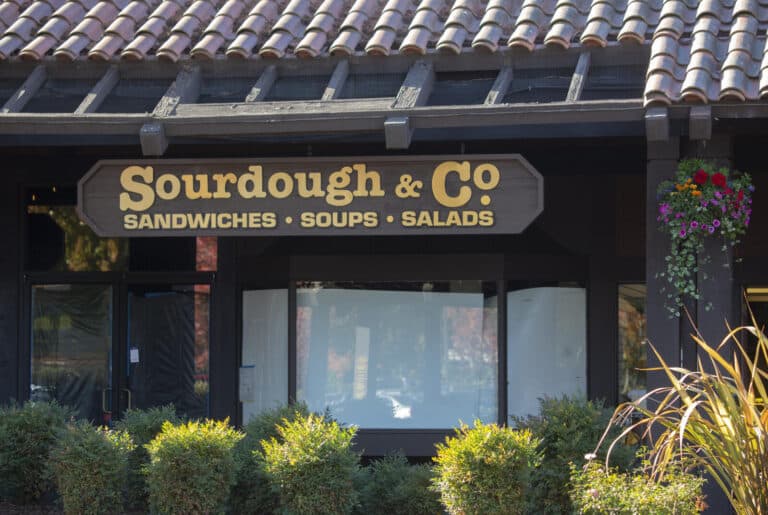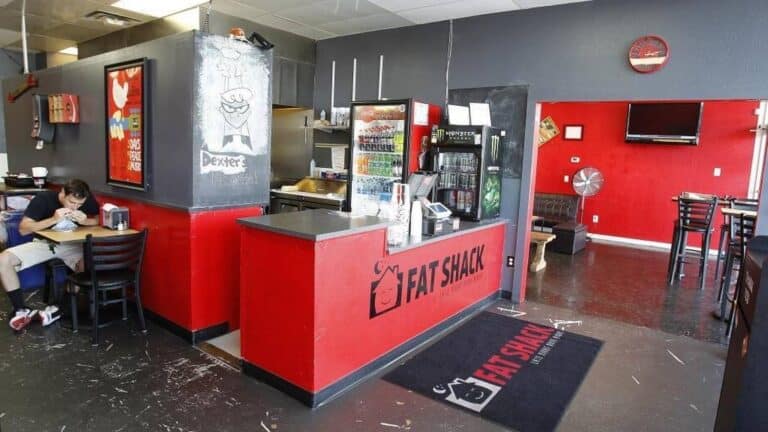Auntie Anne’s Franchise FDD, Profits & Costs (2025)
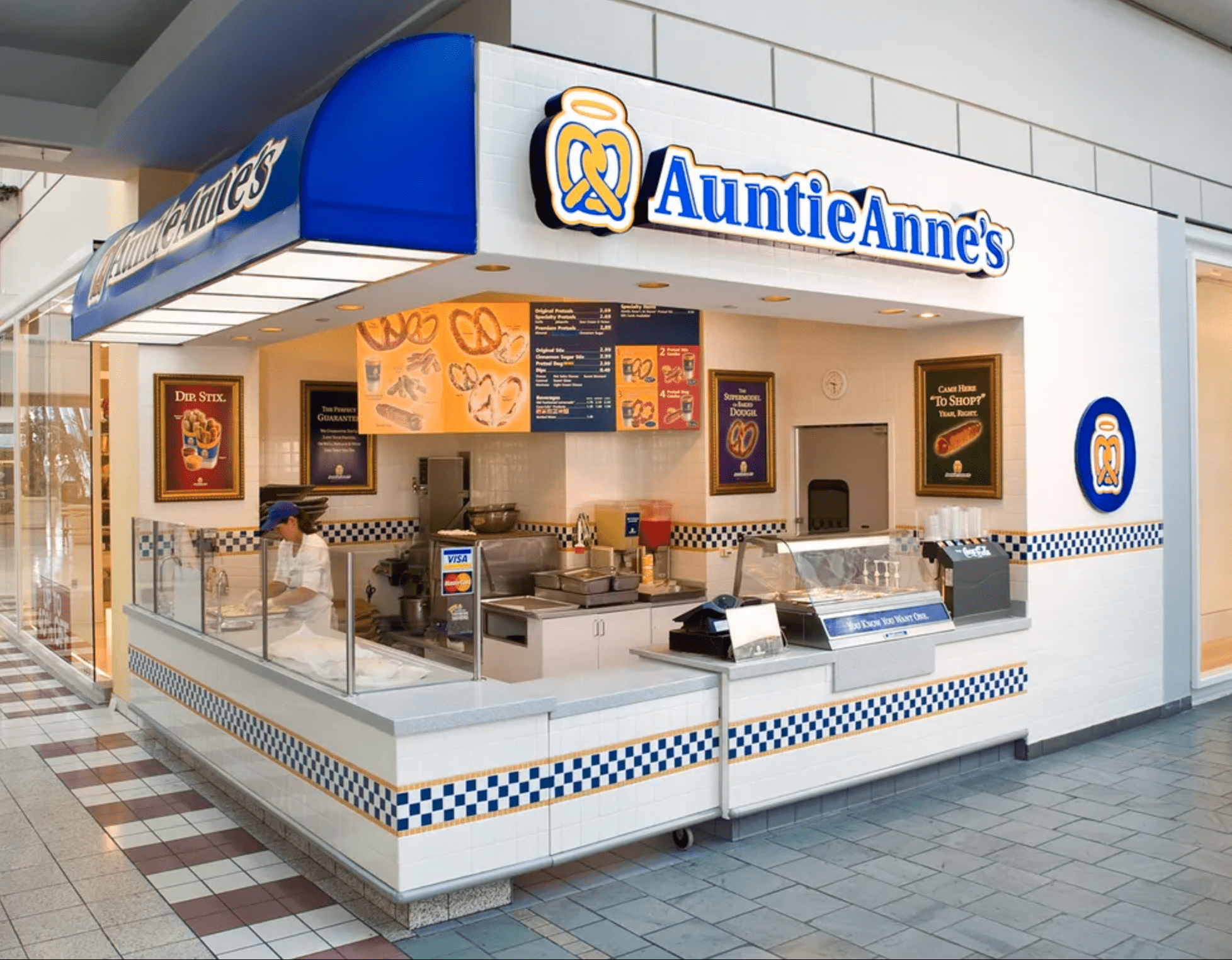
Auntie Anne’s, founded in 1988 by Anne Beiler, is a leading brand in the hand-rolled soft pretzel industry.
It started with a single stand in a Pennsylvania farmer’s market and began franchising in 1991. Known for its freshly baked, hand-rolled pretzels, the brand is loved worldwide for its quality and warm, oven-fresh treats.
Headquartered in Atlanta, Georgia, Auntie Anne’s is the largest hand-rolled soft pretzel franchise globally. It stands out with its commitment to fresh ingredients and a simple, crowd-pleasing menu.
Auntie Anne’s franchise model offers operational simplicity and flexible location options, ideal for high-traffic venues like campuses, airports, and malls.
Franchisees benefit from strong support, including real estate assistance, comprehensive training, and expert business consulting.
Initial Investment
How much does it cost to start a Auntie Anne’s franchise? It costs on average between $115,000 – $1,133,000 to start a Auntie Anne’s franchised restaurant.
This includes costs for construction, equipment, inventory, and initial operating expenses. The exact amount depends on various factors, including the type of restaurant you choose, the location, and whether the franchisee chooses to lease or purchase the property. Indeed, Auntie Anne’s offers 4 types of franchises:
| Shop Type | Initial Investment Range |
|---|---|
| Traditional Shop (Full Shop) | $156,175 to $638,300 |
| Concession Shop – Food Truck | $115,225 to $356,300 |
| Cinnabon Co-Branded Shop | $406,175 to $971,700 |
| Jamba Co-Branded Shop | $460,375 to $1,133,000 |
We are summarizing below the main costs associated with opening a Auntie Anne’s Traditional Shop (Full Shop). For more information on the costs required to start a Auntie Anne’s franchise, refer to the Franchise Disclosure Document (Item 7).
| Type of Expenditure | Amount |
|---|---|
| Initial Franchise Fee | $35,500 |
| Construction and Build Out Costs | $27,000 – $260,000 |
| Permitting | $450 – $8,300 |
| Equipment Package | $25,000 – $65,000 |
| Millwork | $5,000 – $28,000 |
| Furniture | $0 – $2,500 |
| Menu Board, Graphics, and Interior Signage | $250 – $23,000 |
| Exterior Signage | $3,000 – $8,300 |
| Computer System | $10,500 – $32,000 |
| Smallwares | $1,000 – $8,000 |
| Architect/Engineer | $2,000 – $20,000 |
| Rent | $2,000 – $10,000 |
| Grand Opening Marketing | $3,000 – $7,500 |
| Legal and Accounting Fees | $5,000 – $10,000 |
| Insurance | $1,575 – $8,200 |
| Misc. Opening Costs/Office Supplies | $13,000 – $25,000 |
| Security Deposits | $0 – $15,000 |
| Management Training Program Fee | $0 – $3,000 |
| Travel and Living Expenses during Training | $3,600 – $5,700 |
| On-Site Training Fee | $0 – $5,300 |
| Opening Inventory | $3,300 – $4,000 |
| Additional Funds – 3 Months | $15,000 – $54,000 |
| Total Initial Investment | $156,175 – $638,300 |
Average Revenue (AUV)
How much revenue can you make with a Auntie Anne’s franchise? Auntie Anne’s franchised restaurants make on average $832,000 in revenue (AUV) per year.
Here is the extract from the latest Franchise Disclosure Document:
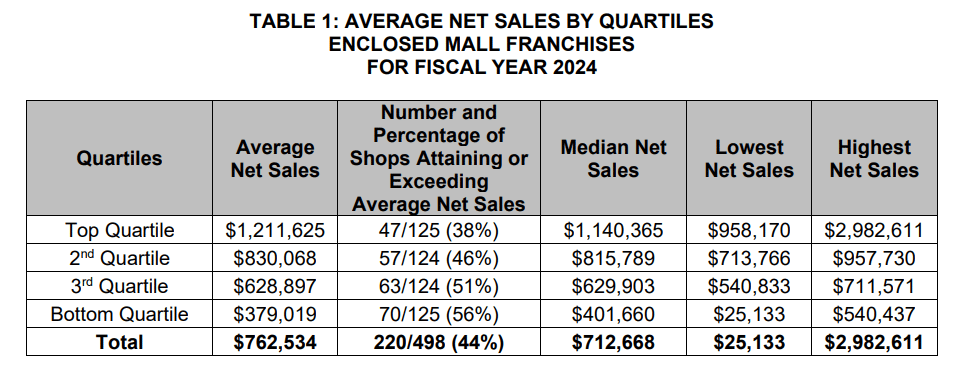
This compares to $819,000 yearly revenue for similar baked goods franchises. Below are a few Auntie Anne’s competitors as a comparison:
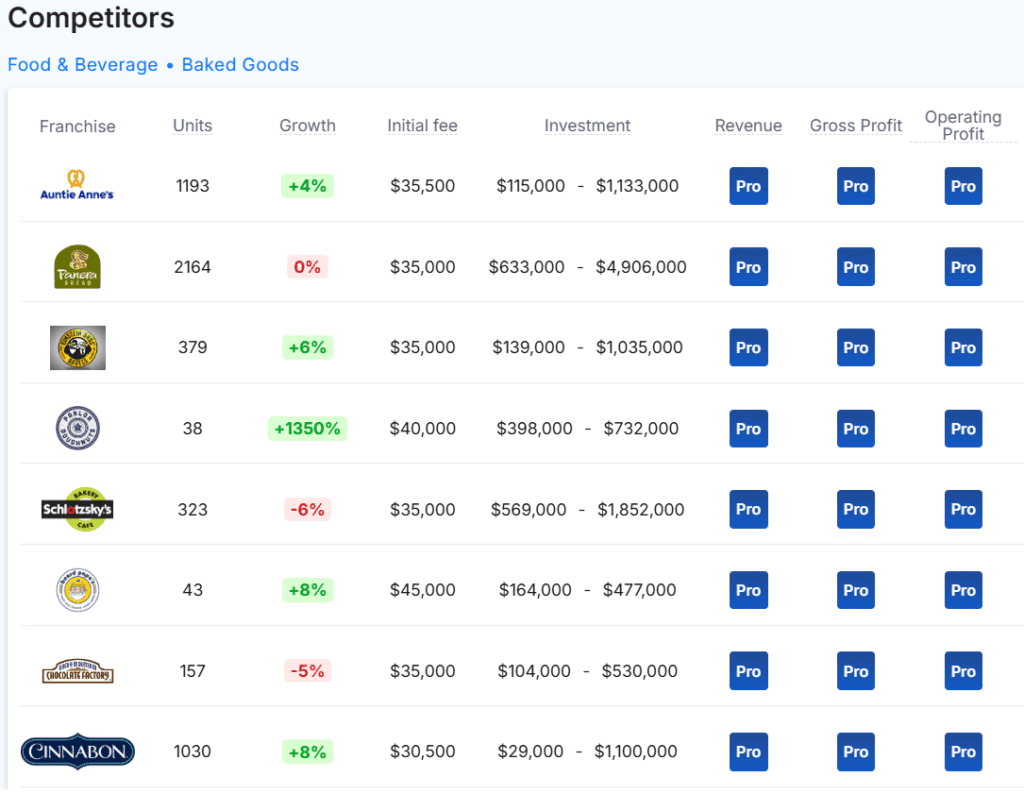
Download the Franchise Disclosure Document
Frequently Asked Questions
How many Auntie Anne’s locations are there?
As of the latest data, Auntie Anne’s operates 1,167 locations worldwide, with more than 1,300 in the United States. This includes approximately 1,156 franchise-owned outlets and 11 company-owned locations.
Auntie Anne’s has a strong presence in high-traffic areas like malls and airports, contributing to its global expansion and continued popularity.
What is the total investment required to open a Auntie Anne’s franchise?
The total investment required to open a Auntie Anne’s franchise ranges from $115,000 to $1,133,000.
What are the ongoing fees for a Auntie Anne’s franchise?
Auntie Anne’s franchisees are required to pay a royalty fee of 6% of net sales, which can potentially increase to 8% at the franchisor’s discretion. Additionally, the marketing fee varies based on the location. For street-side locations, it is 3% of net sales.
For captive audience locations, such as malls or airports, the marketing fee is 1% of net sales, increasing to 1.5% starting in 2024. These fees are essential to maintaining the brand and supporting franchise operations.
What are the financial requirements to become a Auntie Anne’s franchisee?
To become an Auntie Anne’s franchisee, you are required to have a minimum net worth of $300,000 and minimum liquid assets of $120,000.
These financial benchmarks ensure that franchisees have the necessary capital to manage start-up costs and ongoing operational expenses while providing a buffer for any unforeseen challenges during the business’s early stages.
How much can a Auntie Anne’s franchise owner expect to earn?
The average gross sales for a Auntie Anne’s franchise are approximately $0.83 million per location. Assuming a 15% operating profit margin, $0.83 million yearly revenue can result in $125,000 EBITDA annually.
Who owns Auntie Anne’s?
Auntie Anne’s is owned by Focus Brands, a large franchise operator that also owns other well-known brands like Cinnabon, Carvel, Jamba, and Moe’s Southwest Grill.
Focus Brands acquired Auntie Anne’s in 2010. Focus Brands itself is a portfolio company of Roark Capital Group, a private equity firm that specializes in managing a wide range of franchise businesses.
Auntie Anne’s was originally founded by Anne Beiler in 1988, and it has since grown into a globally recognized pretzel brand.
Disclaimer
Disclaimer: This content has been made for informational and educational purposes only. We do not make any representation or warranties with respect to the accuracy, applicability, fitness, or completeness of the information presented in the article. You should not construe any such information or other material as legal, tax, investment, financial, or other professional advice. Nothing contained in this article constitutes a solicitation, recommendation, endorsement, advertisement, or offer to buy or sell any franchises, securities, or other financial instruments in this or in any other jurisdiction in which such solicitation or offer would be unlawful under the franchise and/or securities laws of such jurisdiction.
All content in this article is information of a general nature and does not address the detailed circumstances of any particular individual or entity. Nothing in the article constitutes professional and/or financial and/or legal advice, nor does any information in the article constitute a comprehensive or complete statement of the matters discussed or the law relating thereto. You alone assume the sole responsibility of evaluating the merits and risks associated with the use of any information or other content in this article before making any decisions based on such information or other content.

